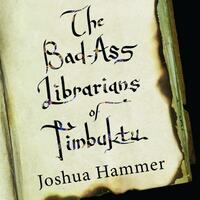You need to sign in or sign up before continuing.
Take a photo of a barcode or cover
624 reviews for:
The Bad-Ass Librarians of Timbuktu: And Their Race to Save the World's Most Precious Manuscripts
Joshua Hammer
624 reviews for:
The Bad-Ass Librarians of Timbuktu: And Their Race to Save the World's Most Precious Manuscripts
Joshua Hammer
The narrator wasn't good, and the vibe didn't work for me. It felt kind of anti-Muslim.
Too much politics and explanations. Not enough storytelling. It started out well, but then I found myself drifting off too often and not remembering anything I’d read.
informative
slow-paced
I fear someone lost the plot.
There was so much information about the middle east, US politics, and historical context that there was not much given to the ACT of saving the precious manuscripts. I wanted ACTION. And instead I almost keeled over from the information overload and passed out at my desk.
There was so much information about the middle east, US politics, and historical context that there was not much given to the ACT of saving the precious manuscripts. I wanted ACTION. And instead I almost keeled over from the information overload and passed out at my desk.
adventurous
challenging
hopeful
informative
inspiring
reflective
tense
medium-paced
I loved about 25% of this book.
Hammer explains how one man worked tirelessly to collect manuscripts from locals in northern Mali and how Haidara set up "shop" in Timbuktu where he started to repair, catalogue, digitize, and display them. Then radical Muslims from the north part of Mali started moving into central Mali where they began destroying cultural artifacts, including books.
Hammer does much to explain local politics and explain specific leaders of radical Muslim cells. I admire his depth of knowledge in this area, but I really wanted to focus more on the books and how they were collected and then saved. The detail about kidnappings, ransoms, changes in leadership and various military actions were not interesting to me--at the level of detail that he presented. I can see how people interested in contemporary Mali affairs should know this information. But I wasn't the audience.
That being said, the first five chapters (until page 69) were very compelling. These chapters talked about the history of Timbuktu as a scholarly center. Hammer describes Haidara's book collecting efforts and describes some of the wonderful books in the collection. I have often heard that Africa's literature is oral more than written. These chapters demonstrate that this is a blatant falsehood.
When the Muslim extremist start to move closer to Timbuktu, Haidara and his associates work to first hide the books locally then move the books to the southwestern portion of Mali, away from those who seek to destroy the books.
Nevertheless, the radicals do destroy a few thousand books. But a greater number were preserved. This book encourages me to learn more about African scholarship that actually does exist! Good to know.
Hammer explains how one man worked tirelessly to collect manuscripts from locals in northern Mali and how Haidara set up "shop" in Timbuktu where he started to repair, catalogue, digitize, and display them. Then radical Muslims from the north part of Mali started moving into central Mali where they began destroying cultural artifacts, including books.
Hammer does much to explain local politics and explain specific leaders of radical Muslim cells. I admire his depth of knowledge in this area, but I really wanted to focus more on the books and how they were collected and then saved. The detail about kidnappings, ransoms, changes in leadership and various military actions were not interesting to me--at the level of detail that he presented. I can see how people interested in contemporary Mali affairs should know this information. But I wasn't the audience.
That being said, the first five chapters (until page 69) were very compelling. These chapters talked about the history of Timbuktu as a scholarly center. Hammer describes Haidara's book collecting efforts and describes some of the wonderful books in the collection. I have often heard that Africa's literature is oral more than written. These chapters demonstrate that this is a blatant falsehood.
When the Muslim extremist start to move closer to Timbuktu, Haidara and his associates work to first hide the books locally then move the books to the southwestern portion of Mali, away from those who seek to destroy the books.
Nevertheless, the radicals do destroy a few thousand books. But a greater number were preserved. This book encourages me to learn more about African scholarship that actually does exist! Good to know.
While the author's writing style and constant jumping around through dates of history are difficult to follow and repetitive, the overall determination of Abdel Kader Haidara and his network tell an amazing tale of cooperation and the importance of shared cultural heritage.
A really enjoyable read. I liked the way the author stayed out of the way of the main character despite being involved in many aspects of the story. This book did a great job of transporting you to the sandy dunes of the Sahara and help the reader understand the emergence of Al-Qaeda in Northern Mali.
Recommended background music while reading: Tinariwen, Fela Kuti.
Recommended background music while reading: Tinariwen, Fela Kuti.
I just finished The Bad-Ass Librarians of Timbuktu, and I think it should have a separate review.
First, the book automatically gets a star for the title. You could write "lorem ipsum" for all the text, and the title would still get a star.
I'm of two minds of the book itself. On the one hand, it is an excellent picture of how the Islamic civil war (Sunni vs Shiite vs Wahhabi) is going on in North Africa. Joshua Hammer, the author, was a long-time Middle-East correspondent for Newsweek, and he knows how to dig into the nitty-gritty of how personal and familial relationships can influence the ideological.
On the other, purely selfish, hand—I WANT TO KNOW MORE ABOUT THE BOOKS! There's all kinds of derring-do and close calls, and entire collections get burnt before our despairing eyes….
But what is THERE? I want to know what scholar's works were saved, why this manuscript is especially prized, what we lost in those bonfires.
Hammer is a war correspondent, which is entirely laudable in its own way. Someone needs to chronicle what is happening.
But he's not a historian. And I wish someone could have chronicled how others chronicled their own times.
First, the book automatically gets a star for the title. You could write "lorem ipsum" for all the text, and the title would still get a star.
I'm of two minds of the book itself. On the one hand, it is an excellent picture of how the Islamic civil war (Sunni vs Shiite vs Wahhabi) is going on in North Africa. Joshua Hammer, the author, was a long-time Middle-East correspondent for Newsweek, and he knows how to dig into the nitty-gritty of how personal and familial relationships can influence the ideological.
On the other, purely selfish, hand—I WANT TO KNOW MORE ABOUT THE BOOKS! There's all kinds of derring-do and close calls, and entire collections get burnt before our despairing eyes….
But what is THERE? I want to know what scholar's works were saved, why this manuscript is especially prized, what we lost in those bonfires.
Hammer is a war correspondent, which is entirely laudable in its own way. Someone needs to chronicle what is happening.
But he's not a historian. And I wish someone could have chronicled how others chronicled their own times.
adventurous
dark
informative
tense
slow-paced
Parts of this book felt disconnected from others, particularly the middle chapters that were slow, crawling explorations of terrorist’s lives and backgrounds. It was hard for me to understand, until the final chapters (when the pace picked back up again) the significance or importance of including this information. I think key figures could have been introduced much more succinctly.
adventurous
informative
inspiring
reflective
tense
medium-paced




